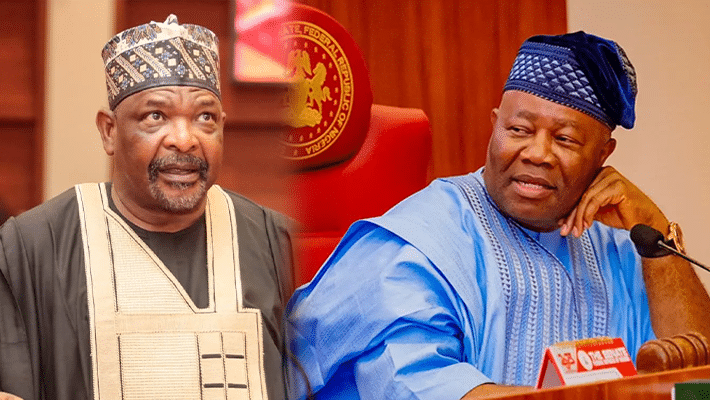News
Breaking: Akpabio Dragged To Court Over Failure To Recall Senator Ningi, Budget Padding

The Socio-Economic Rights and Accountability Project (SERAP) has filed a lawsuit against the Senate President Godswill Akpabio over the failure to refer the alleged N3.7 trillion budget padding to appropriate anti-corruption agencies for investigation and prosecution, and to recall Senator Abdul Ningi who blew the whistle on the allegations.
Recall that the Senate suspended Ningi in March for three months over his allegations that the 2024 budget was padded by over N3 trillion and that the country is operating two budgets.
In the suit number FHC/ABJ/CS/452/2024 filed last Friday at the Federal High Court, Abuja, SERAP is seeking an order of mandamus to direct and compel Akpabio to refer the alleged N3.7 trillion budget padding to appropriate anti-corruption agencies for investigation and prosecution of suspected perpetrators.
SERAP is also seeking an order of mandamus to direct and compel Akpabio to immediately take steps to ensure the reinstatement of whistleblower Abdul Ningi who was suspended from the Senate over his allegations that the lawmakers padded the 2024 budget by irregularly inserting projects worth N3.7 trillion.
SERAP is also seeking an order of mandamus to direct and compel Akpabio to put in place transparency and accountability mechanisms to ensure that the trillions of Naira budgeted for constituency projects are not embezzled, misappropriated or diverted into private pockets.
In the suit, SERAP is arguing that: “Granting this application would serve the public interest, encourage whistleblowers to speak up, improve public services, and ensure transparency and accountability in the management of public resources.”
SERAP is arguing that, “Directing Mr Akpabio to refer these allegations to appropriate anticorruption agencies and to reinstate whistleblower Abdul Ningi would be entirely consistent and compatible with the letter and spirit of the Nigerian Constitution 1999 [as amended] and the country’s international obligations.
“The allegations by Senator Ningi amount to public interest disclosures and can contribute to strengthening transparency and democratic accountability in the Senate in particular and the country as a whole.”
According to SERAP, the Suspension of Senator Ningi by the Senate followed a seriously flawed process and it amounts to retaliation.
SERAP is also arguing that, “Senator Ningi’s status as a whistleblower is not diminished even if the perceived threat to the public interest has not materialised, since he would seem to have reasonable grounds to believe in the accuracy of the allegations of budget padding and corruption in the Senate.”
The suit filed on behalf of SERAP by its lawyers, Kolawole Oluwadare and Adelanke Aremo, read in part: “It is in the public interest and the interest of justice to grant this application. No whistleblower should ever be penalised simply for making a public interest disclosure.
“Directing Mr Akpabio to refer the allegations to appropriate anticorruption agencies would help to address the lingering problem of budget padding and corruption in the implementation of constituency projects.
“Directing Mr Akpabio to refer the allegations to the Independent Corrupt Practices and Other Related Offences Commission (ICPC) and Economic and Financial Crimes Commission (EFCC) would also ensure probity and accountability in the budget process.
“Investigating and prosecuting the allegations of budget padding and corruption would end the impunity of perpetrators. It would build trust in democratic institutions with the ultimate aim of strengthening the rule of law.
“Years of allegations of budget padding and corruption in the implementation of constituency projects have contributed to widespread poverty, underdevelopment and lack of access to public goods and services.
“Allegations of budget padding and corruption in the implementation of constituency projects have also continued to have negative impacts on the fundamental interests of the citizens in several communities and the public interest.
“Combating budget padding would improve access of Nigerians to basic public goods and services, and enhance the ability of ministries, departments and agencies to effectively and efficiently discharge their constitutional and statutory responsibilities.
“Section 15(5) of the Nigerian Constitution requires public institutions to abolish all corrupt practices and abuse of power.
“Section 16(2) of the Nigerian Constitution further provides that, ‘the material resources of the nation are harnessed and distributed as best as possible to serve the common good.’
“Section 13 of the Nigerian Constitution imposes clear responsibility on the National Assembly including the Senate to conform to, observe and apply the provisions of Chapter 2 of the constitution.
“Section 81 of the Nigerian Constitution and sections 13 and 18 of the Fiscal Responsibility Act constrain the ability of the National Assembly to unilaterally insert its own allocations in the budget without following the due process of law.

